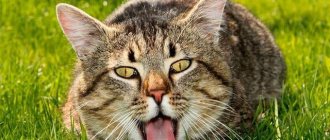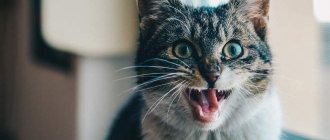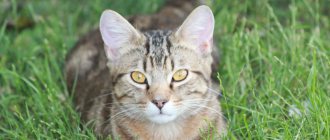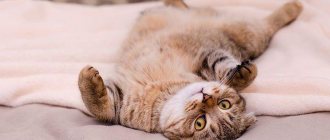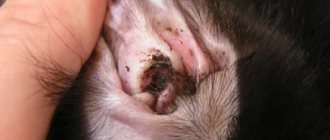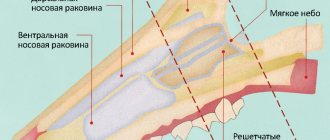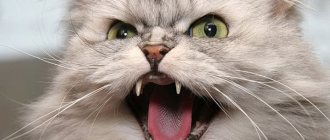Cats foam at the mouth. Reasons causing hypersalivation:
- infections (calicivirus, herpesvirus, rabies and others);
- stomatitis (inflammatory disease of the oral mucosa);
- gingivitis (inflammation of the gums);
- trauma to the mouth or tongue;
- caustic/caustic toxins (such as household cleaners and some indoor or outdoor plants);
- erosions and ulcers on the tongue and in the oral cavity;
- foreign bodies or tumors in the mouth and esophagus;
- neurological disorder of chewing or swallowing (paresis of the pharyngeal muscles due to botulism, etc.);
- nausea;
- certain metabolic disorders : hepatoencephalopathy - a disorder of the nervous system due to liver dysfunction;
- hyperthermia - increased temperature;
- uremia - the effect of toxins on the body due to impaired kidney function;
Diagnosis of ptyalism in cats
As we've learned, there are many different causes of excessive salivation. Therefore, when visiting a veterinary clinic, be sure to give the doctor your pet's complete medical history to help identify potential causes. You should provide details about your cat's health, vaccinations, any medications (such as anthelmintics), possible exposure to toxins, and whether your cat has eaten any objects. You also need to describe the symptoms in detail.
After collecting anamnesis, the doctor conducts a thorough examination. Some patients sometimes require sedation (putting them into a state of light sleep without anesthesia).
Additional studies may include:
PCR diagnostics to confirm/exclude viral infection;
X-ray of the oral cavity to exclude dental problems and check for the presence of foreign objects in the digestive tract (only high-density radiopaque areas are detected);
Chest and abdominal radiographs to evaluate structures in the chest and abdomen;
Contrast radiography of the esophagus to identify/exclude a foreign body;
Complete blood test to assess immune status. It also helps determine the presence or absence of anemia (low levels of red blood cells in the blood);
Biochemical blood test (general profile and additional indicators) to assess kidney and liver function;
Urinalysis to assess kidney function.
Treatment of drooling in cats depending on the cause
Based on the problem that causes ptyalism, there are various treatment methods.
Poisoning
In most cases, if a toxic substance is ingested, it is necessary to induce vomiting.
But there are situations when it is strictly forbidden to induce vomiting (for example, in case of poisoning with caustic substances and petroleum products).
Veterinarians also perform gastric lavage with large amounts of water using a special tube-probe, which is passed through the esophagus to the stomach. To neutralize the poison in the stomach, the animal is washed with crushed activated carbon, and the sorbent is also given simply in crushed form, mixed with water. The introduction of antidotes - substances that neutralize poisons - is possible only if it is known exactly what caused the poisoning. Also, in case of poisoning, infusion therapy in a hospital setting is required to more quickly remove toxins from the body and the use of symptomatic medications.
Dental problems
If your cat is foaming at the mouth due to dental or oral disease, it may be due to abscesses. In this case, dental surgery will be needed. Single or multiple tooth extractions may also be required. Any wounds must be cleaned and an antibiotic may be prescribed to clear up the infection.
Neoplasms
If neoplasms are detected, you need to see an oncologist, and then, together with your doctor, decide on further treatment tactics. Surgical removal may be needed or chemotherapy, which can be used to target tumors at the microscopic level.
Kidney or liver diseases
In case of organ failure, it is necessary to conduct a full examination of the pet and prescribe treatment to reduce intoxication in the body.
Infusion therapy in a hospital setting under the supervision of physicians is often required. Sometimes a special diet is necessary. In this case, the veterinarian recommends a medicinal line of food.
Presence of a foreign body
To remove a foreign object that causes salivation, sedation is most often used, that is, the animal is put into a state of sleep. In some cases, endoscopic or abdominal surgery may be required.
Side effects of veterinary drugs
Some veterinary medications, such as anthelmintics, hepatoprotectors or hormonal agents, can cause increased salivation in some animals. As a rule, this symptom stops spontaneously and the pet does not require additional help. The only exceptions are cases of individual intolerance.
What to do after an attack
After an epileptic seizure, the patient needs peace and rest, since during an attack the body depletes resources and needs to be replenished. Before the ambulance arrives, provide the victim with complete comfort and psychological support. Try to rid him of all irritants and remain calm.
An ambulance should be called only if the seizure lasts more than 3 minutes, or if it recurs. Professional help is also necessary if during an attack the patient injures himself, is injured or suffocates. After an epileptic attack, the following steps should be taken:
- put the patient on his side and let him rest for a few minutes;
- if the attack happened in a crowded place, ask everyone to move away to ensure psychological comfort for the victim;
- if a person involuntarily empties his bowels or bladder, try to clean the area and remove dirty clothes;
- notify the patient’s relatives or loved ones about what happened, especially if he is a minor or an elderly person;
- do not leave the patient for at least another 15-20 minutes, since normalization of the condition does not occur immediately. Transport the victim home if he wishes.
It is important to understand that even the correct implementation of first aid cannot guarantee the absence of the risk of developing side complications. Immediately after an epileptic seizure, the patient should be admitted to the neurology clinic of the Yusupov Hospital, where the best neurologists in the capital will determine the diagnosis and prescribe concomitant treatment. Examinations in the hospital are carried out using modern European equipment, which allows you to obtain the most accurate results. Our medical staff is ready to provide first aid in emergency situations throughout the day.
The cat is drooling from his mouth: what to do at home, prognosis of the course of the disease
Our recommendations apply only to home care after visiting a veterinarian.
Hypersalivation in cats is a dangerous symptom, and you cannot help your pet yourself - it can only worsen the situation.
First of all, be sure to call your doctor and take any measures only on the basis of consultation.
During your visit to the clinic, all necessary treatment, medications, care and feeding regimen will be prescribed by your doctor. It is necessary to strictly follow the instructions and regularly contact the veterinarian.
The prognosis depends greatly on the disease that has been diagnosed.
If your cat is suspected of having rabies, it must be quarantined at the Animal Disease Control Station.
Dental problems are usually solved with surgery and cleaning of the mouth. Your doctor may prescribe special medications for home care.
Recovery from poisoning depends largely on how quickly the poisoning was identified and what substance caused it.
The prognosis for kidney and liver disease is guarded and lifelong treatment is often required.
When diagnosing a malignant tumor, the prognosis depends on the type of tumor.
Provoking factors
Often, epileptic seizures occur from various “triggers” - situations that provoke an attack. This could be a bright flashing picture, a sequence of sharp sounds. There are cases where overly bright cartoon screensavers caused a negative reaction in children. The danger comes from flashing, rapidly changing images that overload sensitive systems.
If the attack is caused by just such a factor, then it is better to get rid of it at the first opportunity: turn off the TV, turn down the volume. After the attack ends, ensure that you stay in a quiet room with dim lighting. If you do not get rid of the triggers, they can provoke a series of repeated attacks, which will not be easy for the body to survive.
Preventing excessive drooling in cats
There are some things you can do to minimize the risk of hypersalivation:
- Vaccinate all animals living in the same area against rabies and the most common infections, regularly deworm them and treat them against ectoparasites.
- Maintain good oral hygiene (brush your teeth, use special foods and products to maintain oral hygiene). For example, toothpastes “Globalvet”, “Veda”, “Klini”, “Beafar”, “8 in 1”.
- Visit veterinary clinics periodically to have your pet examined. The “tail” needs to undergo a preventive examination at least once a year.
- Prevent your cat from having access to caustic or toxic substances and dangerous plants.
- Keep the area where your pet lives clean.
- Remove all small objects, threads, needles, rain, etc. from your pet’s access area
Health to you and your cats!
First aid algorithm
First aid for an epileptic seizure is extremely important, since incorrect actions can not only not help the victim, but also worsen the situation. If someone nearby begins to show symptoms of an impending seizure, you should prepare:
- find out whether the person has had epileptic seizures before;
- If a person has epilepsy, he must immediately take the pills prescribed by the doctor to block the seizure. At the same time, people nearby should not give the patient tablets of unknown origin;
- secure your location, move to a safe, uninhabited place;
- if the situation occurs indoors, it is necessary to open windows or doors to ensure the flow of fresh air;
- the patient's head should be placed on one side to avoid choking on saliva or vomit;
- provide the patient with a fall on a soft surface, place an additional soft object under the head so that the head is higher than the body;
- remove all potentially traumatic objects;
- remove belts, necklaces, hats and all things that can squeeze, cause discomfort and make breathing difficult.
